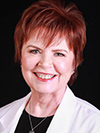Human touch has long been an important part of health care
 by Patricia Wyatt-Harris, MD —
by Patricia Wyatt-Harris, MD —
Since I started medical school, I have always introduced myself to new patients with a handshake. I also shake hands with family members when I meet them before surgery and when I talk to them after surgery to tell them how it went. When I delivered babies, I shook the hands of the parents to congratulate them.
Come to think of it, I have shaken a lot of hands in my lifetime.
I was taught that when giving bad news, touching the patient helps a lot. I specifically remember having to tell a patient that she had a fetal demise when I was a first-year resident.
The patient was close to her due date, but she noticed that the baby had stopped moving. When the sonogram was done, there was no heartbeat. I asked my senior resident for advice. I didn’t know how I was going to tell the patient such devastating news. I remember very clearly that she said, “Touch her, make eye contact, and be honest about your findings. This is never easy.”
In our new COVID-19 world, we know that shaking hands can spread disease. Even when we are able to go to church in person, we won’t be able to “pass the peace” like we used to. We used to shake hands or touch a person’s shoulder. That won’t be happening anytime soon.
I find myself apologizing for not shaking hands. I guess I want my patients to know that I would do that if I could. They all understand, but I’ve shaken hands for so long that it feels awkward if I don’t.
We also are wearing masks at all times in the office, so our facial expressions are muted. I guess we can do a lot with our eyes and our voices, but things have really changed.
I’m getting used to this, but sometimes I forget. I wear gloves throughout the exam, even for parts that I used to do without gloves. The other day, I completed my exam on an older lady and took off my gloves. She then had trouble sitting up from a lying position, so I instinctively reached for her hand with my bare hand. I immediately reached for the hand sanitizing gel when I left the room.
Being a physician involves close contact with other human beings. Diagnosis and treatment typically require touching. Relating to patients and their families also often involves touching. I hope the changes this pandemic has brought don’t change the way physicians treat patients. I hope we can continue to give patients what they need psychologically. We want them to know that we are still the same, even though we have to act differently.
Physicians of the MSSC are continuing to do an amazing job. I know we will make necessary changes and will continue to provide excellent health care.


